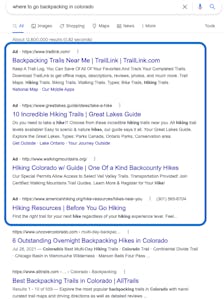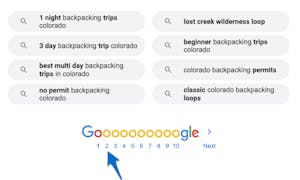- 7 minute read
- Pay-Per-Click
- SEO
Intermediate
Join hundreds of other operators and REGISTER NOW for Spark 2024 New Orleans October 13-15th!

We’ve long been conditioned to equate SEO success with ranking – a website’s position on the search engine results page (SERP) for a given keyword. It’s only natural to strive for the top spot. We’ve even published a Compass guide on how to rank on the first page of Google. But have you ever wondered if all the time and energy you spend trying to rank number one actually pays off?
We know it’s tempting, but there’s so much more to SEO than ranking number one for a specific keyword. In fact, other metrics like engagement and conversions are more valuable. Plus, with constant ranking fluctuations, and the new continuous scrolling update on mobile (more on this in a moment!), ranking number one doesn’t carry as much weight as it used to. Here are some considerations to make when it comes to tracking your site’s success on the SERP.
Your Google ranking for a particular keyword might seem like just a number, but there’s a lot going on behind the scenes. There are so many factors that go into site ranking, like site size and age, keyword competition, and domain authority, among others.
Websites can take a pretty long time to reach their top spot on the SERP, typically around 6 months and even up to a year if your industry or location is highly competitive.
And then there are the fluctuations. Keyword rankings are constantly changing based on trends, Google algorithm updates, and competition, making it difficult to stay in a given ranking position forever.
It’s best to think of Google’s ratings as fluid and highly varied based on searcher and business location. It’s time to abandon the number one ranking mindset and focus on the SERPs as drivers of revenue and engagement.
According to a Moz study, 66% of marketers care most about conversions and revenue while only 18% prioritize rankings as their most important business goal.
With local listings like the Google Map Pack, featured snippets and paid listings dominating the top of the SERP, your organic listing will almost never be the very first link on the page.
Nowadays, paid listings blend right into the organic ones at the top of the page, making them harder to distinguish than they were in the past. Even if your site ranks number one for a given keyword, your listing is actually the third or fourth item on the page after the ads. In the below screenshot, the organic results begin in the 5th spot!

Something else to keep in mind is with all the different types of results on the SERP, the first spot doesn’t even get as many clicks as one might imagine. According to an Ahrefs study of 100,000 search queries with at least one thousand monthly searches:
The top-ranking listing gets the most clicks only 49% of the time!
This leaves lots of room for lower-ranked listings to get their share of clicks – and it means you can stop worrying about being number one and start focusing on getting relevant, qualified search traffic.
What happens when you get to the bottom of a Google SERP on desktop? If you didn’t find what you’re looking for, you might click to the second page to see more results.

But what about if you’re browsing on mobile? Google recently updated mobile search in the U.S. to continuously scroll as more results automatically load. This means you don’t have to click to the second or third page to load more results.
What does this mean for your website? It’s good news! For searchers, it’s now possible to continue scrolling through a seemingly endless list of results. For you, it means that if your site ranks on the second or third page of Google, the searcher will be more likely to see it, leading them to click on your site when they possibly would not have discovered it on desktop. This is yet another reason to be sure to optimize your website for mobile.
Of course you want to improve your search traffic – and ranking number one is certainly a big achievement – but missing out on the top SERP spot doesn’t have to cost you in terms of engagement.
As you evaluate your SEO success, look at rankings as just one piece of the puzzle. Other areas to improve are link building and local SEO. These strategies both emphasize relevancy and getting qualified traffic to your site – people who are actually likely to convert. After all, what’s so great about being number one if you have few conversions to show for it?
When you change the way you conceptualize SERP success, you’ll see a whole array of new opportunities for analyzing data and site performance.